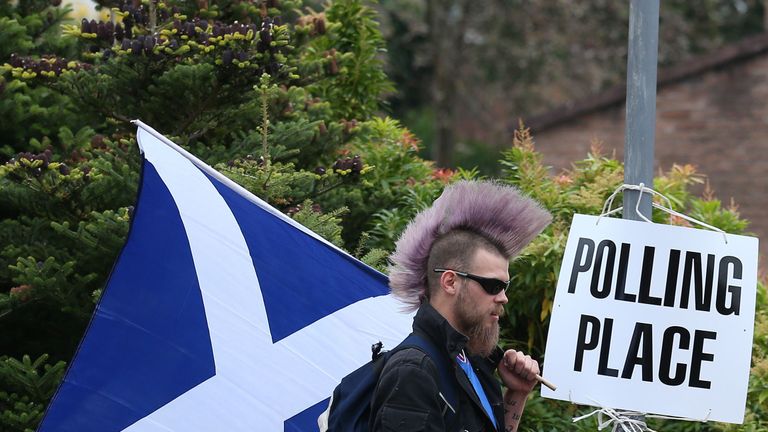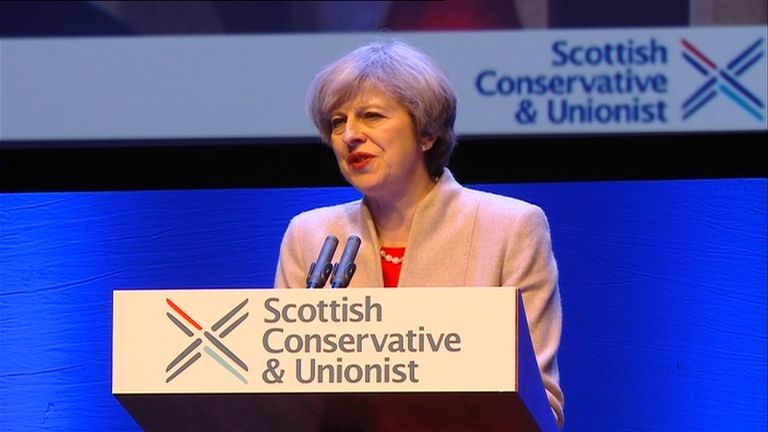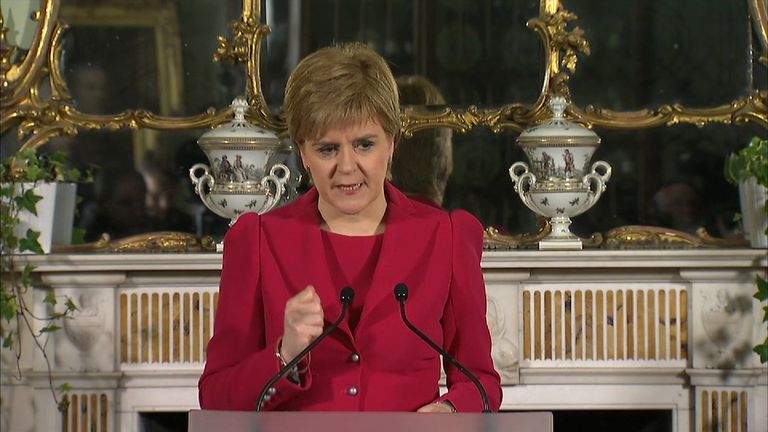Is Scotland on the road to independence?
Nicola Sturgeon wants the Scottish Parliament to choose a date but it is Theresa May's call - and that strengthens the PM's hand.
Monday 13 March 2017 18:51, UK
She laid the hand of history on her Twitter feed first.
Nicola Sturgeon sent a 7.45am tweet as a trail for an "important speech".
A minute later, her husband and SNP chief executive retweeted with the pointy finger emoji and, by midday, the #indyref2 project was given the thumbs up.
It was an announcement assigned to a Monday morning in Bute House rather than kept for the party conference at the weekend.
SNP strategists prefer drawing room elegance for the big announcements, the stateswoman backdrop for the big statements.
So much for the strategy - what of the substance?
Does this put Scotland on a road that leads to independence?
Let's assume that Theresa May does grant the Section 30 order that permits a referendum which isn't, of course, certain.
Indeed, after the UK Government had given its initial response to Ms Sturgeon's speech, one of her team told me they were surprised that they hadn't issued a flat "no", adding that if the British Prime Minister does block a second referendum, it would be an "act of political folly with politically incendiary consequences".
Timing is key.
Ms Sturgeon says she wants the Scottish Parliament to decide a date but it's Mrs May's call - and that strengthens her hand. It's in her gift to construct a framework around indyref2 that suits herself.
Her preferred schedule could be long into the future, say, at a time when Brexit terms are finalised and looking their best to a Scottish electorate - sweetened, perhaps, by powers repatriated to Scotland.
If she delays until after Brexit, an independence campaign would be handicapped by a starting point out with the European Union, even if it shores up the votes of some who want Scottish independence but want out of the EU.
Knocking a referendum into 2019 would also enter a time frame in which the SNP had been in power for 11 years, and it's a government whose popularity is already being tested.
Then, of course, some of the big obstacles in 2014 still need to be overcome in 2017.
Principally, the economy.
The SNP acknowledges that any referendum vote will depend on affordability, economic certainty.
It was a lack of both that undermined the 2014 campaign and the questions on the economy remain today, yet bigger than they were before.
In 2014, the No campaign pulled on the emotional strings of British solidarity.
The late, lamented David Bowie was a poster boy for keeping the Union together.
Three years on, Brexit is characterised by "scary monsters and super creeps" who engineered an EU exit that most Scots didn't want (1,661,191 voted to remain and 1,018,332 to leave).
SNP veterans of the 2014 campaign believe the emotional argument to stay in the UK will be much weaker if there is a next time, that voters who shared solidarity with those in other parts of the UK now see themselves in a politically different place.
They believe a sense of "democratic deficit" can boost a Yes vote the second time around.
One told me: "Scotland voting one way and getting something different will draw people towards Yes.
"If Yes can secure a score draw on the economy, an overall argument of economic viability and prospects for success, we can win it on the big picture - where the argument is much more favourable to Yes than it was in 2014.
"If people think it might work, that makes a Yes vote more likely from a politically democratic point of view.
"Most people who voted in 2014 believed a Labour Government was months away - that's not the case now."
Recent opinion polls suggest a tight contest.
There was an even split amongst voters in one poll last week.
A separate survey for The Herald newspaper, published hours before Ms Sturgeon took to her feet, had No to independence at 52% and Yes on 48%.
On the subject of polls, it's worth noting that a solid majority of Scots don't want a referendum at all.
Sadly for them, there is no ballot paper for that.







